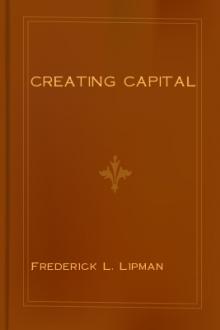The Man-Eaters of Tsavo - J. H. Patterson (funny books to read txt) 📗

- Author: J. H. Patterson
- Performer: -
Book online «The Man-Eaters of Tsavo - J. H. Patterson (funny books to read txt) 📗». Author J. H. Patterson
The news of the death of the second “devil”
soon spread far and wide over the country, and natives actually travelled from up and down the line to have a look at my trophies and at the “devil-killer”, as they called me. Best of all, the coolies who had absconded came flocking back to Tsavo, and much to my relief work was resumed and we were never again troubled by man-eaters.
It was amusing, indeed, to notice the change which took place in the attitude of the workmen towards me after I had killed the two lions.
Instead of wishing to murder me, as they once did, they could not now do enough for me, and as a token of their gratitude they presented me with a beautiful silver bowl, as well as with a long poem written in Hindustani describing all our trials and my ultimate victory. As the poem relates our troubles in somewhat quaint and biblical language, I have given a translation of it in the appendix. The bowl I shall always consider my most highly prized and hardest won trophy. The inscription on it reads as follows:—
SIR, — We, your Overseer, Timekeepers, Mistaris and Workmen, present you with this bowl as a token of our gratitude to you for your bravery in killing two man-eating lions at great risk to your own life, thereby saving us from the fate of being devoured by these terrible monsters who nightly broke into our tents and took our fellow-workers from our side. In presenting you with this bowl, we all add our prayers for your long life, happiness and prosperity. We shall ever remain, Sir, Your grateful servants,
Baboo PURSHOTAM HURJEE PURMAR,
Overseer and Clerk of Works,
on behalf of your Workmen.
Dated at Tsavo, January 30, 1899.
Before I leave the subject of “the man-eaters of Tsavo,” it may be of interest to mention that these two lions possess the distinction, probably unique among wild animals, of having been specifically referred to in the House of Lords by the Prime Minister of the day. Speaking of the difficulties which had been encountered in the construction of the Uganda Railway, the late Lord Salisbury said:—
“The whole of the works were put a stop to for three weeks because a party of man-eating lions appeared in the locality and conceived a most unfortunate taste for our porters. At last the labourers entirely declined to go on unless they were guarded by an iron entrenchment. Of course it is difficult to work a railway under these conditions, and until we found an enthusiastic sportsman to get rid of these lions, our enterprise was seriously hindered.”
Also, The Spectator of March 3, 1900, had an article entitled “The Lions that Stopped the Railway,” from which the following extracts are taken:—
“The parallel to the story of the lions which stopped the rebuilding of Samaria must occur to everyone, and if the Samaritans had quarter as good cause for their fears as had the railway coolies, their wish to propitiate the local deities is easily understood. If the whole body of lion anecdote, from the days of the Assyrian Kings till the last year of the nineteenth century, were collated and brought together, it would not equal in tragedy or atrocity, in savageness or in sheer insolent contempt for man, armed or unarmed, white or black, the story of these two beasts.
“To what a distance the whole story carries us back, and how impossible it becomes to account for the survival of primitive man against this kind of foe! For fire — which has hitherto been regarded as his main safeguard against the carnivora — these cared nothing. It is curious that the Tsavo lions were not killed by poison, for strychnine is easily used, and with effect.
(I may mention that poison was tried, but without effect. The poisoned carcases of transport animals which had died from the bite of the tsetse fly were placed in likely spots, but the wily man-eaters would not touch them, and much preferred live men to dead donkeys.)
Poison may have been used early in the history of man, for its powers are employed with strange skill by the men in the tropical forest, both in American and West Central Africa. But there is no evidence that the old inhabitants of Europe, or of Assyria or Asia Minor, ever killed lions or wolves by this means. They looked to the King or chief, or some champion, to kill these monsters for them. It was not the sport but the duty of.
Kings, and was in itself a title to be a ruler of men. Theseus, who cleared the roads of beasts and robbers; Hercules, the lion killer; St.
George, the dragon-slayer, and all the rest of their class owed to this their everlasting fame.
From the story of the Tsavo River we can appreciate their services to man even at this distance of time. When the jungle twinkled with hundreds of lamps, as the shout went on from camp to camp that the first lion was dead, as the hurrying crowds fell prostrate in the midnight forest, laying their heads on his feet, and the Africans danced savage and ceremonial dances of thanksgiving, Mr. Patterson must have realised in no common way what it was to have been a hero and deliverer in the days when man was not yet undisputed lord of the creation, and might pass at any moment under the savage dominion of the beasts.”
Well had the two man-eaters earned all this fame; they had devoured between them no less than twenty-eight Indian coolies, in addition to scores of unfortunate African natives of whom no official record was kept.
THE COMPLETION OF THE TSAVO BRIDGE
When all the excitement had died down and there was no longer any dread of the man-eaters, work went on briskly, and the bridge over the Tsavo rapidly neared completion. As the piers and abutments progressed in height, the question of how to lift the large stones into their positions had to be solved. We possessed no cranes for this purpose, so I set to work and improvised a shears made of a couple of thirty-foot rails. These were bolted together at the top, while the other ends were fixed at a distance of about ten feet apart in a large block of wood. This contrivance acted capitally, and by manipulation of ropes and pulleys the heavy stones were swung into position quickly and without difficulty, so that in a very short time the masonry of the bridge was completed.
The next business was to span the sixty-foot distance between the piers with iron girders. As I had neither winches nor sufficient blocks and tackle to haul these over into position, I was driven to erect temporary piers in the middle of each span, built up crib-shape of wooden sleepers.
Great wooden beams were stretched across from the stone piers to these cribs, and laid with rails; and the girder was run over its exact place, while still on the trucks in which it had been brought up from the coast. It was next “jacked” up from the trucks, which were hauled away empty, the temporary bridge was dismantled, and the girder finally lowered gently into position. When the last girder was thus successfully placed, no time was lost in linking up the permanent way, and very soon I had the satisfaction of seeing the first train cross the finished work.
Curiously enough, only a day or so after the bridge had been completed and the intermediate cribs cleared away, a tremendous rain-storm broke over the country. The river started to rise rapidly, soon flooding its banks and becoming a raging murky torrent, tearing up trees by the roots and whirling them along like straws.
Steadily higher and higher rose the flood, and standing on my bridge, I watched expectantly for the two temporary trolley bridges — which, it will be remembered, we had built across the stream in order to bring stone and sand to the main work — to give way before the ever-rising volume of water. Nor had I long to wait; for I soon caught sight of a solid mass of palm stems and railway sleepers sweeping with almost irresistible force round the bend of the river some little distance above the bridge. This I knew was the debris of the trolley crossing furthest up the river. On it came, and with it an additional bank of stormy-looking water. I held my breath for the space of a moment as it actually leaped at the second frail structure; there was a dull thud and a rending and riving of timbers, and then the flood rolled on towards me, leaving not a vestige of the two bridges behind it. The impact, indeed, was so great that the rails were twisted round the broken tree-trunks as if they had been so much ordinary wire. The double tier of wreckage now swept forward, and hurled itself with a sullen plunge against the cutwaters of my stone piers. The shock was great, but to my immense satisfaction the bridge took it without a tremor, and I saw the remnant of the temporary crossings swirl through the great spans and quickly disappear on its journey to the ocean. I confess that I witnessed the whole occurrence with a thrill of pride.
We were never long without excitement of some kind or another at Tsavo. When the camp was not being attacked by man-eating lions, it was visited by leopards, hyenas, wild dogs, wild cats, and other inhabitants of the jungle around us.
These animals did a great deal of damage to the herds of sheep and goats which were kept to supply the commissariat, and there was always great rejoicing when a capture was made in one of the many traps that were laid for them.
Leopards especially are most destructive, often killing simply for pleasure and not for food: and I have always harboured animosity towards them since the night when one wantonly destroyed a whole herd of mine. I happened at the time to have a flock of about thirty sheep and goats which I kept for food and for milk, and which were secured at sundown in a grass hut at one corner of my boma. One particularly dark night we were startled by a tremendous commotion in this shed, but as this was before the man-eaters were killed, no one dared stir out to investigate the cause of the disturbance. I naturally thought that the intruder was one of the “demons,” but all I could do was to fire several shots in the direction of the hut, hoping to frighten him away.
In spite of these, however, it was some time before the noise died down and everything became still again. As soon as it was





Comments (0)